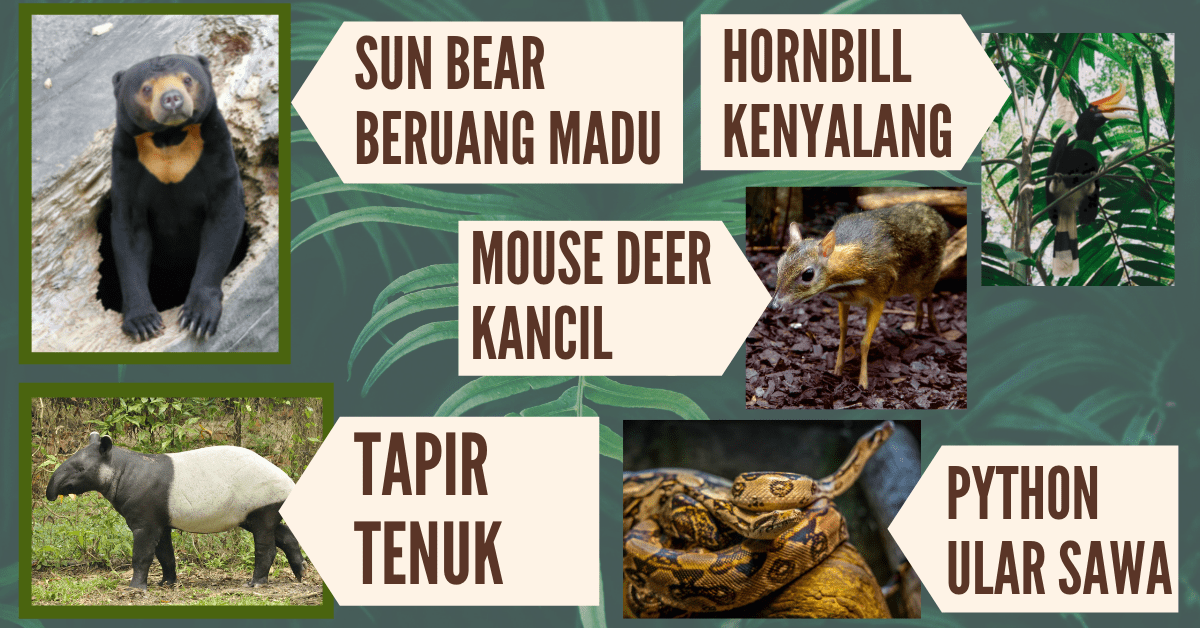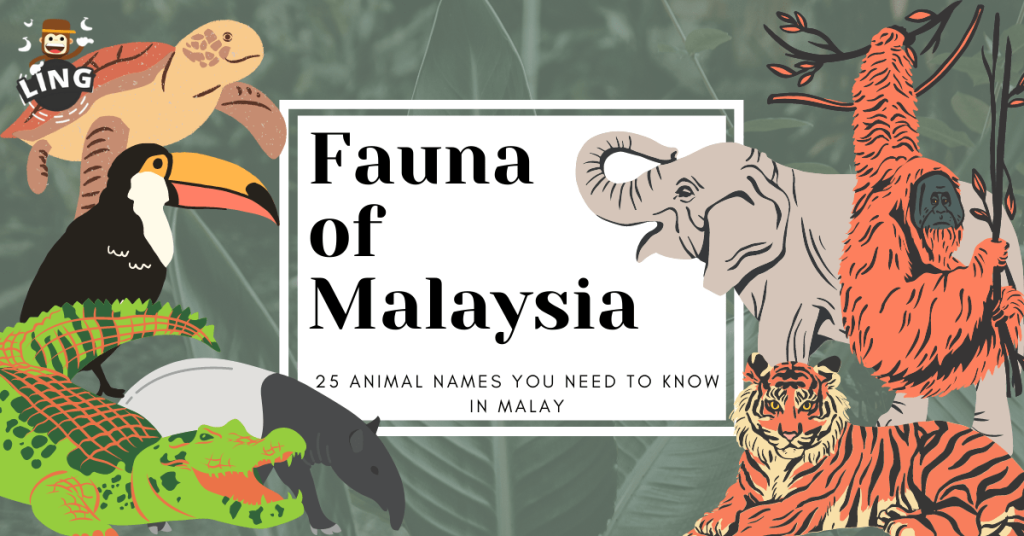Are you a fan of National Geography? Then, get ready because we are about to learn more about the animal in Malay and their names in the Malay Language. Malaysia is heavily dense with ancient rainforests and untouched regions, home to endless lists of flora and fauna. The country’s climate and incredibly diverse rainforest is the reason why Malaysia is one of the most famous wildlife destinations; About two-fifths of peninsular Malaysia and two-thirds of East Malaysia is the home of hundreds of wildlife animals- that’s a lot, and these forests have been that way since 130 million years ago.
However, when it comes to learning a language, it is advisable to learn common names to make it easier to communicate with the locals. So, why don’t we do both? Let’s learn the names of the animals in Malaysia and those common animals in the Malaysian’s daily lives.
Wildlife Animals
Malayan Tiger
Malay: Harimau Malaya
We all know that tigers are the world’s largest cat species, and you can only find them in southeast Asia. As the national animal of Malaysia, Malayan Tiger has a profound symbolism in Malaysia. This is due to how this specific species is native to the land. The Malayan Tiger is native to the Malay peninsula and has been categorized as critically endangered since 2015; experts claimed only around 100 of this species are left. They are said to be slightly smaller than Bengal Tigers.
Malaysians have the tiger symbol in many places, including in the logo of the coat of arms of Malaysia; the logo of Maybank – Malaysian universal bank; the logo of Proton – Malaysia automotive company; and the Football Association of Malaysia. It is also the nickname of the Malaysian football team. This proves how dear the Malayan Tiger is to the Malaysian.
Some of the nicknames given to the Malayan Tiger include “Pak Belang.” Pak Belang can be translated to ‘Uncle Stripes,’ and the name can be found everywhere in Malay folklore.
Orangutan
Malay: Orangutan (Pronunciation: oh-rung-oo-tun)
The name Orangutan was derived from the Malay word orang, meaning “person,” and hutan, meaning “forest” or “jungle.”
These famous great apes used to roam around the world like many apes or monkeys species, but now they can only be found in Sumatra and Borneo (which includes 2 states of Malaysia: Sabah and Sarawak). These huge, reddish-brown grat-apes spent most of their time in trees, and they are the most intelligent primates.
They are highly intelligent, using human tools properly with their hands and fingers; Bornean Orangutans are also the second-largest ape after the gorilla. They have very long arms, grey skin, and shaggy reddish hair.
Same as the tigers, the rare Orangutan is critically endangered. Their lives are constantly threatened by poaching and habitat destruction. Hence, there are conservation and rehabilitation organizations are dedicated to them in the wild.
Hornbill
Malay: Kenyalang (Pronunciation: kuh-nyuh-lung)
Eight different bird species of Hornbill can be found in Sarawak, but the most prominent one in Malaysia is the Rhinoceros Hornbill- which is native to the Borneo land. Aside from being the national bird of Malaysia, the Rhinoceros Hornbill is also the official animal of Sarawak, a state in Borneo. Can you guess Sarawak’s nickname? It’s The Land of Hornbill or, in Malay, Bumi Kenyalang.
This bird has a long curved bill and an upturn casque on its heads, which is not the same case with the different species- arguably one of the beautiful ones among other Hornbill species. They also have large, fatty cheek pads known as flanges.
Like the others I have mentioned before, these rare birds are also on the endangered species list. You can also find some different Hornbills species in a certain location in the Taman Negara, a national park in Peninsular Malaysia. Make sure you check with experts which location of the National Park you can see them before making your Malaysia itinerary!
Turtles
Malay: Penyu (Pronunciation: puh-nyoo)
Many different species of turtles can be found in Malaysia. The long coastline along the Peninsular Malaysia and Sabah and Sarawak have been home to the Malaysian Sea Turtles for centuries. They come and go to the beaches around Malaysia throughout the year, but their peak months are from April to September (for Peninsular Malaysia and Sarawak) and August to October (in Sabah). During these peak months, they come in bigger numbers for landing, nesting, and hatching.
Different species of Malaysian Sea Turtles:
- Green turtles
- Leatherback turtles
- Hawksbill turtles
- Olive Ridley turtles
Malaysia is also the home of more than 200 different species of freshwater turtles and tortoises. Among them, the Malaysian Giant Turtle, also known as the Bornean River Turtle, is the giant freshwater turtle in Southeast Asia; its maximum length can reach up to 80 cm (31 inches).
Monkeys
Malay: Monyet (Pronunciation: moe-nyet)
Monkeys are pretty common in Malaysia. Even though Malaysia houses many different species of monkeys, one particular species drives many Malaysians up the wall! It is the Long-tailed Macaques, or in Malay, we call them Kera
You can find these cheeky little monkeys on every corner of peninsular Malaysia. The reason they drive Malaysians mad is that they are quick to adapt to any environment. May you think monkeys belong in the trees, right? I personally have seen them on my roof, in my backyard, raiding a golf course, attacking restaurants, in classrooms, and also chilling at some university hot spot, to name a few situations. They are vicious when it comes to stealing food to the point where they are considered pests, sadly.
The simplest way a tourist can interact with these monkeys is to go to Batu Caves (close to Kuala Lumpur). You can slowly climb the 200 steps of stairs while holding food, and they will come to you.

Others
| Animals | Haiwan | Extra Info |
|---|---|---|
| Asian Elephant | Gajah Asia | Endangered Species; can be found in the peninsula |
| Sun Bears | Beruang Madu/ Beruang Matahari | Smallest bear species. Native to Malaysia |
| Malayan Tapir | Tapir/ Tenuk/ Cipan | The only tapir species that is native to the Old World |
| Rhinoceros | Badak Sumbu | The Sumatran Rhinoceros became extinct in Malaysia after the last one died in 2019 |
| Lesser Mouse Deer | Kancil | Very famous character in Malaysian folklore, known as Sang Kancil. Known for being smart and sly. |
| Snake | Ular | |
| King Cobra | Ular Senduk / Ular Tedung Senduk | Senduk literally means ladle, referring to the snake’s hood |
| Python | Ular Sawa | One of the longest Python ever caught in Malaysia is 8 meters (26 feet) long, in Penang |
| Deer | Rusa | Can be found in the wild or in a farm |
| Crocodiles | Buaya | Sarawak is known for frequent reports of man-eating crocodile cases |

Pets And Farm Animals
Here are the names of common fauna found in Malaysia. Some of them are better of as pets, while others are common farm animals. But, of course, you can sometimes see them in random parks or visit your nearest rural area to catch a glimpse of these animals.
| English | Malay |
|---|---|
| Dogs | Anjing |
| Cats | Kucing |
| Chicken | Ayam |
| Duck | Itik |
| Pig | Babi |
| Goat | Kambing |
| Cow | Lembu |
| Buffalo | Kerbau |
| Birds | Burung |
| Insects | Serangga |
| Fish | Ikan |
Flora Of Malaysia: Related Vocabularies
| English | Malay |
|---|---|
| Fauna / Animals | Haiwan / binatang |
| Eggs | Telur |
| Wings | Sayap |
| Forest/rainforest | Hutan |
| National Park | Taman Negara |
| Mammals | Mamalia |
| Jungle | Hutan |
| Park | Taman Negara |
| Species | Spesies |
| Sumatran | Sumatera |
| Life | Hidup/ Nyawa |
Want To Meat These Animals In Their Nature? Learn Malay Now!
No, you do not need to learn Malay to meet these rare animals, but you are advised to learn Malay so you can easily visit Malaysia’s hot spots and get around better. The easiest way to achieve your goal is to download the Ling app right now and immerse yourself in exercises and quizzes that can help you memorize grammar and vocabulary better. Trust me, and it can make your trip smoother than you think; also it would be easier to get discounts (thank me later).
So what happens after you visit Malaysia? Increase your knowledge and drown in different languages and cultures through the Ling app. We offer you chances to learn more than 60 languages on this app, all at your own pace. You can also learn more about the languages and their countries by going through our blog posts! Now is your chance to learn as much as you can before the borders open up, and believe me, it is going to be soon.














